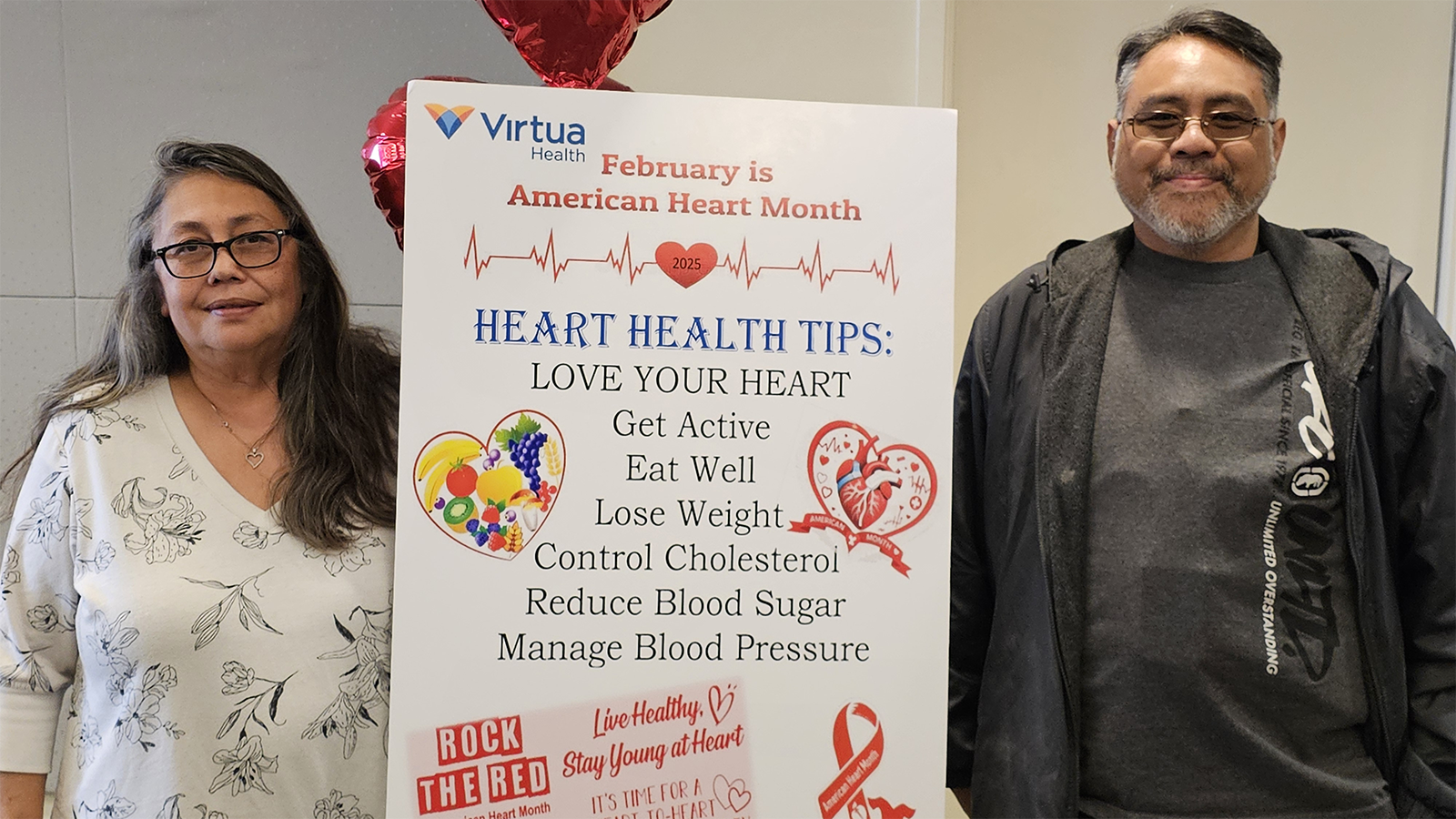Heart Tests Your Doctor May Order
Just like a mechanic checking your car, your doctor performs tests to assess your heart health. Virtua cardiologist Samuel Ventrella, MD, explains the most common tests your doctor may order.
By Samuel Ventrella, MD, Cardiologist – Virtua Cardiology
Screenings are an important part in determining your heart health. Just like a mechanic looks under the hood and examines the tires and brakes to make sure your car is in good working order, your doctor performs tests to assess your risk of heart events and ensure your cardiovascular system is functioning as it should.
Routine screenings you should have include:
- Blood pressure. Everyone should get their blood pressure checked regularly starting at age 20. Ideal blood pressure is lower than 120/80 mm Hg.
- Cholesterol. Have your fasting cholesterol tested at least every four to six years starting at age 20. Cholesterol goals differ based on your history and risk factors.
- Glucose. High blood sugar levels put you at risk for diabetes. Begin testing every three years at age 45, or earlier if you have risk factors such as obesity.
Depending on your risk factors and/or symptoms, your doctor may recommend more detailed tests. These include:
- Electrocardiogram (EKG). This test records the electrical activity of your heart through electrodes attached to your skin. It can show abnormal rhythms, and suggest possible muscle damage. It is generally the first test performed.
- Echocardiogram. This ultrasound test assesses your heart's structure and function.
- Holter monitor. A small, portable, battery-powered EKG records your heart rate and rhythm over 24 to 48 hours. Patches and battery-size devices implanted just under the skin can monitor your heart for longer periods.
- Stress testing. Using electrodes applied to your chest, this test monitors your heart’s response as you walk on a treadmill. This can be combined with ultrasound or nuclear images of your heart for more accurate assessment. A stress test also may be performed with medication for people who are unable to walk on the treadmill.
- Coronary artery calcium scoring. A low-energy CT scan looks for calcium buildup in the arteries supplying oxygen-rich blood to your heart. This can be helpful in making decisions on treatments, such as cholesterol medications for individuals at intermediate risk of developing heart disease.
- Coronary angiography. Also known as cardiac catheterization, this is an invasive evaluation where small tubes called catheters are advanced through the body to directly image your arteries. It serves as a road map for treatments that can restore blood flow to blocked vessels.
- Cardiac MRI. An advanced scan without radiation which can assess multiple cardiac issues, such as scarring of the heart, abnormal deposits in the heart muscle, and assessment of heart strength.
Based on your risk factors or symptoms and the results of diagnostic tests, we will determine your most effective course of treatment. This may include lifestyle modifications, medications, and if necessary, interventional procedures.
Comprehensive heart care near you
Virtua’s team of more than 100 cardiac experts provides comprehensive cardiac care, from medical cardiology to interventional procedures to advanced cardiac surgery.
Schedule an appointment online today or call 888-847-8823. Appointments are available within 48 hours.
There's So Much More to Explore
Discover expert insights, inspiring stories, health tips, and more by exploring the content below!

Can Your Gut Health Affect Your Heart?

How the Unique Stages of a Woman's Heart Affect Her Health

Complex Aortic Surgery Provides Lu’Shell Hope for the Future

HeartTalk Magazine

Are You Eating Too Much Salt? High-Sodium Foods to Watch For

4 Exercise Tips to Help You Reverse High Blood Pressure

Timely Heart Care During a Heart Attack Helps Joe Feed the Community

3 Reasons Why Now's the Time to Find Relief From Varicose Veins

Lifesaving Heart Care Creates a 'Bond That's Never Left Us'

How High Blood Pressure Affects Your Body

5 Interesting Facts About Your Heart

Get to the Bottom of Blood Pressure Numbers

CABG Surgery: What Women Should Know About Heart Health and Healing

When to Take Action for a Stronger Heart

Groundbreaking Renal Denervation Procedure Controls a Lifetime of High Blood Pressure

Patient Story: LVAD Mechanical Pump Strengthens Michael's Heart Function

Mitral Valve Surgery Keeps Yaneth Living the American Dream
Inside Look at Blood Vessels Aids PAD Treatment
Denise Davis: Pay Attention to Your Heart Health

Sweet Music: Trust, Teamwork Save Justin from Heart Attack

Complex Heart Surgery Nets James a Lifelong Friend

8 Key Steps to Better Blood Pressure Control

Signs You Should Get Treated For Vein Problems

One New Heart Valve Saves Two Lives in the Tritten Family

What You Need to Know About Heart Failure

6 Numbers Key to Keeping Your Heart Healthy

Five Mindfulness Tips That Can Help Heal Your Heart

Watchman Heart Device: a Technological Breakthrough for Blood Clot Prevention

Albert's Emergency Cardiac Surgery Is a 'Story of a Lifetime'

Love Your Heart: Essential Care Tips for Every Stage of Life

How Do I Measure My Blood Pressure at Home?

How Do I Improve My Cholesterol Levels?

3 Ways to Reduce Your Stroke Risk
Advanced Heart Failure Therapies Get Bernadine Back to Full Speed

Keeping the Beat: Advanced Heart Surgery for Aortic Aneurysm

Heart-Healthy Summer Recipe: Hummus and Veggies

4 Delicious Heart-Healthy Recipes Perfect for Summer

Heart Healthy Summer Recipe: Dessert Parfait

Heart-Healthy Summer Recipe: Pear and Walnut Salad

Heart-Healthy Summer Recipe: Terrific Turkey Burgers
Atrial Fibrillation and Stroke: What's the Connection?
Heart Tests Your Doctor May Order
Managing Pregnancy for Mothers With Heart Conditions

Heart Healthy Recipe: Basil Pesto Pasta With Seared Vegetables

Heart Healthy Recipe Chocolate Avocado Chia Pudding
Keep Your Heart Rhythm in Check With Your Smartwatch
Mind Your Meds for Blood Pressure Risks
Magic Pill for Heart Health? Cut 300 Calories a Day
3 Smart Ways to Boost Your Heart Health
3 Best Exercises For Heart Health

Get Your Heart Pumping With These 25 Workout Songs
Your Chest Pain: Heartburn, Heart Attack, or Something Else?
3 Heart Healthy Recipes to Win Valentines Day
How Work and Home Stress Can Affect You
Why Improving Your Health Is Going To The Dogs And Cats
Why Younger Women Need Start NOW To Safeguard Their Hearts From Heart Attacks
Can You Die of a Broken Heart?
Mitral Valve Surgery Opens Doors for Improved Quality of Life
6 Healthy Habits to Start in Your 20s for Better Lifelong Health
Do You Have a Fatty Heart?
Get Pumped! Assist Devices Can Improve Heart Failure Symptoms
A Cardiologists Advice on Heart-saving Emergency Cardiac Care
Virtua Doctor’s Experience Is a Warning for All About COVID-19 and Strokes
You May Feel Fine, but Gregory Says "Don't Skip Your Medical Care"
In Sickness and in Health: Couples Often Share Heart Disease Risk
"Reduce Your Heart Disease Risk With a Plant-based Diet"
Hybrid Robotic Heart Surgery and Valve Replacement Restores Quality of Life
Can Marijuana Hurt Your Heart Health?
6 Tips for Restoring Your Heart Rhythm
Eat Smart for Your Heart
Cardiac Rehab: Strengthening Your Heart After Leaving the Hospital
Your Heart Needs A Good Nights Sleep
Are You at Risk for AAA—the Silent Killer?
The Cardio Oncology Team Protects Your Heart During Cancer Treatment
Get Relief From Painful Varicose Veins This Summer
Exercise Your Way to a Stronger Heart
Fish Oil: A Good Catch or a Scam?
My Heart Seems to Skip a Beat - Should I Be Worried?
Menu Planning? Try These 5 Heart-smart Substitutions

5 Health Risks Tied to Weight

